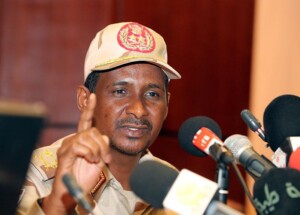Minister of Finance claims military junta will maintain control over multiple Sudanese authorities
Jibril Ibrahim, Minister of Finance and head of the Justice and Equality Movement, said that the military junta intends to maintain its control over sovereign and security authorities, defence authorities, foreign relations and international cooperation authorities, and all other authorities during negotiations over the executive government through the Security and Defence Council.
 Jibril Ibrahim speaks at forum in Khartoum in November 2020 (SUNA)
Jibril Ibrahim speaks at forum in Khartoum in November 2020 (SUNA)
Jibril Ibrahim, Minister of Finance and head of the Justice and Equality Movement, said that the military junta intends to maintain its control over sovereign and security authorities, defence authorities, foreign relations and international cooperation authorities, and all other authorities during negotiations over the executive government through the Security and Defence Council.
He said in a press conference in Khartoum on Saturday, that in his opinion, El Burhan's statement in July was about withdrawing from the dialogue, rather than a return to the barracks. Ibrahim explained that it will be easier for Sudan and the democratic transition to maintain the Sovereignty Council with the current authorities instead of establishing a new Security and Defence Council.
On July 4, El Burhan announced that a High Council of the Armed Forces would be formed by commanders from the Sudan Armed Forces (SAF) and the Rapid Support Forces (RSF) “to assume the supreme command of the regular forces and be responsible for security and defence tasks, and related responsibilities, provided that its tasks are completed in agreement with the government that is formed”.
The statement comes after Sudan’s Vice President of the Sovereignty Council and Commander of the Rapid Support Forces (RSF), Lt Gen Mohamed ‘Hemeti’ Dagalo, said in a briefing on Saturday that he is committed to his previous pledge to remove the military institution from the political scene. In an RSF media briefing, he added that he would ensure that the military “devotes its efforts to the tasks stipulated in the constitution and the law”.
QUAD mechanism
Ibrahim also predicted the failure of the ‘QUAD’ for Sudan, namely Saudi Arabia, the United Arab Emirates, the USA, and the United Kingdom, due to the mechanisms’ search for legitimacy in the mainstream Forces for Freedom and Change (FFC-Central Council), which he claims is excluding other parties. Regarding Volker Perthes, head of UNITAMS, Ibrahim said that he is not impartial and is not fit to be a mediator, calling on political forces to communicate directly without intermediaries.
The FFC-Central Council has not yet been invited for a meeting with the QUAD mechanism. “When we receive an invite, we will publish it for public opinion,” the group said in a statement on Friday.
In the statement, the FFC-Central Council reiterated that there must be a political process achieves the legitimate aspirations of the Sudanese people in ending and defeating the putschists, restoring the democratic transition, forming civilian constitutional governing institutions, achieving transitional justice, and removing the regular forces from the political process, which should carry out their duties through democratic governance systems.
The FFC signed the Constitutional Document with the military in August 2019, after which a hybrid sovereignty council was formed, and newly installed PM Abdallah Hamdok formed the Council of Ministers.











 and then
and then